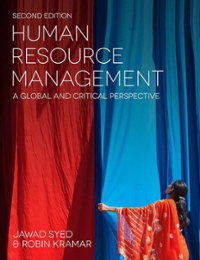As you will see in this chapter, 'talent' is interpreted in different ways across different organisations and
Question:
As you will see in this chapter, 'talent' is interpreted in different ways across different organisations and cultures. Broadly speaking, it can mean exceptional skills relative to others, for example a talented sportswoman has better skills than others in her field, or it can mean the particular, idiosyncratic abilities that people have. This case leans towards the idea of talent as idiosyncratic rather than relative.
A serious economic problem facing the Gulf States is the employment of locals in place of migrants and expatriate workers. Gulf populations are young and growing. Young Saudis and Omanis, for example, want good jobs and a career, but the working populations of the Gulf States contain large numbers of foreign workers. The traditional way of finding jobs for locals has been to expand the public sector with cash from oil revenues. Public sector jobs are attractive to locals because they offer high status and are well paid and secure. But the public sectors in the Gulf cannot keep expanding - employing locals in the private sector is a priority.
To catalyse the employment of locals, Gulf countries and others have created localisation policies (e.g. Saudisation, Omanisation). In essence, these require employers to employ a percentage of locals in their workforce, with the percentage varying by sector and depending upon economic importance and past progress. So, we can see localisation as a particular form of talent management that focuses not on finding the best of the bunch but on deploying the talents of local people in decent jobs and laying the foundations for social and economic progress. But progress towards localisation has been slow. A key question therefore centres around the barriers to localisation: what are they and why do they persist?
Some barriers are well known. They include a lack of management and leadership training for locals, poor training, poor English language training, and negative perceptions of private sector employment by locals. New research, however, has revealed some more complex structural problems (AI Nahdi and Swailes, 2015). Bearing in mind that many foreign managers have influence over staffing decisions and that many private organisations are owned by locals, additional barriers to employing local talent include:
- Networking among expatriate managers suppresses the employment of locals.
- Local owners and managers preferring to employ foreign workers because they are perceived as being more productive.
- Inter-faith barriers - most foreign workers are not Muslim and observe different religious practices at work.
- Local owners and managers preferring to employ foreigners with whom they can maintain a greater social distance because of differences in language and customs.
Local talent therefore, in its broadest sense, is being suppressed by a lack of opportunity. Despite long-standing efforts by governments to increase the percentage of locals in the workforce, there are some deep-rooted barriers that impede progress. Some changes seem relatively easy, such as prioritising better language and management training, but some of these barriers will not be overcome in the short term. Foreigners prefer to employ foreigners because they are seen as more productive and easier to manage, and some locals who are owners and/or managers can control their businesses more easily through foreigners than through other locals by leveraging differences in language and culture.
Social barriers of this kind are not easily dismantled, and the case illustrates the sorts of issues that arise in talent identification and that can be extrapolated to talent management in organisations. Identifying talent is fraught with impressions, feelings, and biases.
Questions
1 Why can cash-rich governments not continue to expand the public sector to employ locals?
2 To what extent would you agree with the suggestion that foreign workers in the Gulf States are more efficient and productive than local workers?
3 What types of prejudices might exist against local workers in the Gulf and Middle East?
Step by Step Answer:

Human Resource Management A Global And Critical Perspective
ISBN: 9781137521620
2nd Edition
Authors: Jawad Syed, J; Kramar Syed, Robin Kramar





